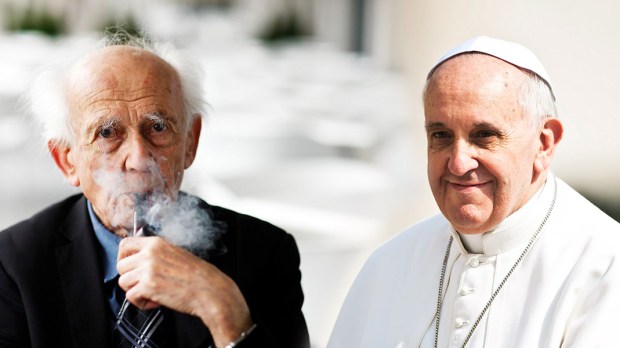Zygmunt Bauman, the famous sociologist who died a year ago and who called himself a “pessimist” of modern society, had a noteworthy and yet undocumented meeting with the pope of “hope.” Two opposite figures? It would seem so to the naked eye, but that’s hardly the case.
On September 20, 2016, in Assisi, in the Land of St. Francis, the “liquid society” theorist shook hands with the first Latin American pope, whose pontificate proclaims joy, beauty, hope, and mercy. The private conversation of two protagonists of the history of our time had remained until now in a private circle and in the memory of few close friends.
“I have worked all my life to make humanity a more hospitable place. I reached 91 years old and I saw false starts until I became pessimistic … Thank you, because you (Pope Francis) are for me the light at the end of the tunnel of negative globalization,” Zygmunt Bauman told the pope in Assisi, five months before his death.
Andrea Riccardi, founder of the Sant’Egidio community, told the Catholic Italian newspaper Avvenire about that unprecedented statement. The ex-communist philosopher paid no attention to obsequious comments or easy flattery. However, with Pope Francis something changed.
The context of the meeting was equally memorable: the celebration of 30 years of the World Day of Peace that John Paul II had instituted in Assisi in 1986, to mark religions’ contribution to peace and dialogue.
Bauman participated in the meeting in Assisi in 2016 and listened very carefully to Pope Francis’ speech. Riccardi explained that the famous sociologist was there because he was well known in Italian cultural circles, especially on topics pertaining to global dialogue.
Bauman traveled to Assisi with his life partner, Aleksandra Kania, a sociologist who is Polish and Catholic. Riccardi said Bauman and Aleksandra had a long friendship that began in the 1950s and that it blossomed into love when both were over 80 years old. Although she is the daughter of the Polish communist leader Boleslaw Bierut, she is faithful to the Catholic Church.
Next to the basilica where the relics of the “poor saint” are kept, Bergoglio and Bauman met in a private room after lunch with various religious leaders, including Patriarch Bartolomeo. Their meeting took place in the old Franciscan convent, called the Sacred Convent, inaugurated in the 13th century after the beatification of St. Francis.
Riccardi said the sociologist expressed all his understanding and closeness to what Pope Francis was saying and doing in the world. Buaman and Kania were among the few who had a private meeting with the pope that day.
The founder of Sant’Egidio admits that it was not an absolute novelty because Bauman had already spoken public words of appreciation for Francis; for example, he had done so two days before at a conference in the forum on interreligious dialogue in Assisi.
“The professor did not hide all his ‘pessimism’ about the situation and the development of the contemporary world. But in front of the pope, he said that at his age he saw him as a ‘light at the end of the tunnel.'” The pope told his collaborators that he was surprised by Bauman’s words and his lucidity.
“The pope quipped: ‘Nobody told me I was at the bottom of a tunnel.’ And Bauman responded: ‘Yes, but as a light.'”
Two different personalities and discordant visions of life, and yet, notes Riccardi, a strong point of convergence.
“The ‘message of Francis’ was a ‘light’ at the end of the ‘tunnel’ of ‘negative globalization,’ which characterized the first two decades of the 21st century.” Bauman, “with his ‘pessimism’ expressed a severe critique of globalization, characterized by a series of later fears, such as the evil of the millennium, mad cow disease, terrorism, etc.’ The series of those events is one of the main causes of the ‘uncertainty’ of the global citizen and, above all, of his withdrawal towards himself and the present, which pushes him not to wait, but to build ‘walls’ against the other,” argued the historian.
Another previously unpublished fact is that Francis had read Bauman. Riccardo notes that in the summer of 2017, Francis asked his collaborators to bring him some of his books.
In February 2017, Francis said in a spontaneous speech before the students of the public university of Rome that beauty, hope, and diversity in a globalized world are possible, even in times of “a liquid society,” and he quoted Bauman.
Probably, that light that Bauman has seen in the pope is reflected in that speech where both thoughts converge and — I would say — are perfected from existential Christian phenomenology. The pessimistic philosopher and the theologian of hope complement each other to give the world a healthy balance of recognizing the evil in the world, without remaining in the swamp of the world.

